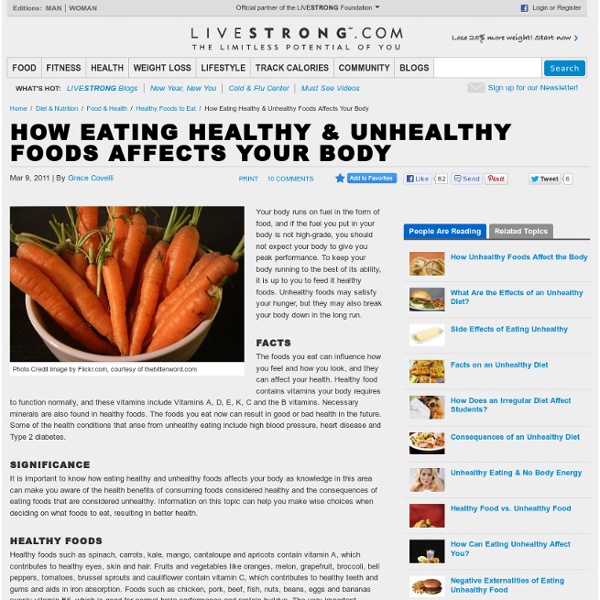How Eating Healthy & Unhealthy Foods Affects Your Body

Unhealthy Eating Habits
There are several key reasons why people develop unhealthy eating habits, most of it can be attributed to lack of planning and awareness. But you don't have to be a victim of poor eating habits. Below are few unhealthy habits that people struggle with. Too Few Meals During the Day When most people go on a diet, they tend to skip meals and especially breakfast. Most meals are skipped early in the day only to fight overpowering temptation later in the day. Include 3 low calorie meal plans in your diet each day. Unaware of Calories and Fat Most people eat foods with no idea of the calorie or fat value. Buy a calorie counter book and learn the calorie and fat value of every food that you eat. Junk Food Leads to More Junk Food The problem with eating unhealthy foods is it makes you crave even more junk food. If you need help losing weight, let us help.
Balanced Diet
These activities will help children to learn about food groups and how to maintain a balanced diet. As well as games for children, there are also links to useful and informative sites for parents and carers. Follow the links below to the free healthy eating games and activities - click on the picture or the name of the resource to start. Other Resources Recommended sites with healthy eating ideas and resources: www.eatwell.gov.uk - The Food Standards Agency's consumer advice and information site. Balanced Diet Resources:
Healthy eating - recipes
Eating healthily can be hard when you've got a family to feed on a budget but goodtoknow is here to show you how to make healthy meals - without it costing the earth. Our healthy recipes section has hundreds of different recipes, so we can guarantee you will find something delicious to feed your family. If you want to make sure you stick to your healthy eating plan (this time!) we have some easy things you can do to make it a little bit easier: Don't forget breakfast! We know everyone always says it but breakfast really is the most important meal of the day. Plan your food At the start of the week/month, take a little time out to sit down and plan exactly what you're going to eat. Pick what suits you There are loads of different diets out there but they may not suit you or your situation. Keep full You can have the best intentions, but if you're hungry - you're going to snack. Homemade not shop-bought Treat yourself Never allowing yourself a treat will only make you crave them more.
Health: Nutrition
18 June 2014Last updated at 16:26 The human body needs a balanced diet to deliver vital nutrients What's your idea of a perfect meal? Sushi? A large piece of cake followed by hot chocolate? Cutting through the myriad of diet plans and faddish eating regimes, the human body needs a balanced, healthy eating plan to keep functioning properly. Grow and build Repair and heal Reproduce successfully Repel illnesses and infections Avoid weight-related health problems Eating a variety of foods can also reduce the risk of getting conditions including heart disease, stroke, some cancers, diabetes and osteoporosis. The foods we need to eat can be divided into five separate groups. The reason we need a diet drawn from all of the groups is that they all deliver different, but vital, nutritional benefits to our bodies. Fruit and vegetables are one of our main sources of vitamins and minerals, which the body needs to perform a variety of functions well. For more information and advice, go to NHS Choices
Related:
Related:



